London Film Festival 2018, Final Report: From Beale Street To Classic Hollywood
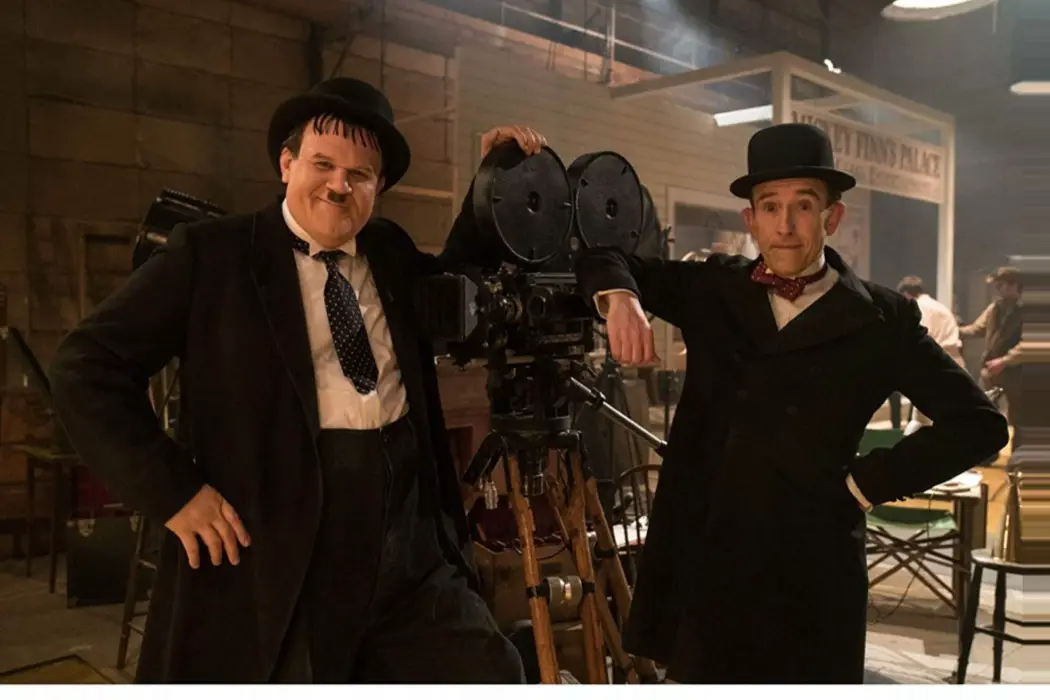
Alistair is a 25 year old writer based in Cambridge.…
Our London Film Festival coverage couldn’t last forever, and even with a team of writers we still could only scratch the surface of this year’s lineup. Before we get into the final batch of reviews, we just want to thank everybody who has been reading our articles for the last few weeks – and to the festival organisers for showcasing some boldly original films, and inviting us along to them.
So, for the last time this year, here are the movies we’ve seen this week.
Holy Tour (Méryl Fortunat-Rossi & Valéry Rosi)
Chloe Walker: Each year, high in the French Alps, a group of senior citizens make a temporary campervan community. The reason? They want a front row seat when the Tour de France passes by. Holy Tour follows our merry band of seniors as they spend ten days awaiting the highlight of their year.
Holy Tour is a slight, simple documentary. At seventy minutes long, it doesn’t get close to overstaying its welcome. That’s what makes it so good. There are no delusions of grandeur here; no deep and meaningful messages to convey. Co-directors Méryl Fortunat-Rossi and Valéry Rosier found a group of entertaining characters, and wanted to share them with the world. How lucky for us that they did.

Most of the characters come in pairs. One couple reminisce about their first meeting, 56 years ago, when they danced a tango the night he came back from the war in Algeria. A husband makes sure to go on a hike every day, so he doesn’t have to join his wife in watching ‘The Young And The Restless’. A third couple recall their spelunking days. There are stories in every vehicle, and each one makes a delightful listen.
As the tour gets closer, excitement starts to heat up. Last year, an ad break ruined our intrepid group’s chance to get on TV, and anxiety levels are high that this will happen again. Many phone calls are made to families back home, with precise instructions where they’ll be when the cameras arrive. When the big day dawns, our group of OAPS are joined by a bunch of rowdy young newcomers, aggravating one lady in particular. Still, the spirit of the day wins out, and as the tour moves on to the next stage, big smiles adorn every face in the crowd.
But did they get on TV? You’ll have to watch the film to find out…
If Beale Street Could Talk (Barry Jenkins)
Nathan Osborne: With such ravishing visuals, mostly terrific performances and luscious direction, If Beale Street Could Talk is a film worth speaking about. Writer-director Barry Jenkins follows up the Oscar-winning Moonlight with a similarly tender, powerful and measured piece of filmmaking, adapting James Baldwin’s novel of the same name for the screen.
Like a finely-tuned orchestra, Beale Street is a richly-textured and superbly-crafted film that operates as a beautiful harmony. Understated and considered, with the most stirring sense of poignancy, it immerses you in an era – nay, a feeling – that is so dashingly compelling and fulfilling that you cannot help but be enraptured with the experience. Alongside an utterly stunning score from Nicholas Britell and extraordinary cinematography from James Laxton, pouring such captivating detail and enhancing emotion from every single frame, Beale Street is quite the cinematic treasure.
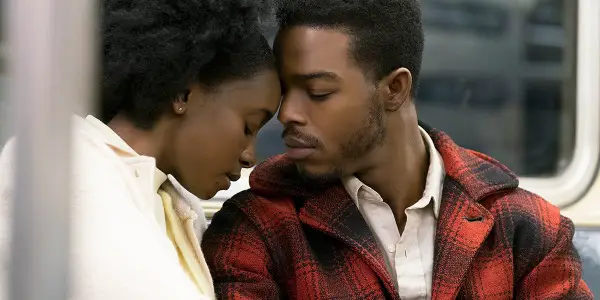
Stephan James and Regina King are mightily impressive, rendering a great deal of anguish and frustration into their characters; they each intensify the script’s themes effectively, exploring the segregation and judgement of the era with complexity and dynamism, driving the film’s messages. It takes a while to warm to KiKi Layne’s lead performance in all honesty – even exiting the theatre, I remained unsure on how to take to her purposely restrained turn – but you come to appreciate the rawness of her work, subtleties, nuance and all. She forms a chemistry that crackles with James, and the pair are utterly convincing as lovers in a harsh time.
If there’s one element that weakens Beale Street though, then it is the adapted screenplay itself; reminiscent of 2016’s Fences, this is clearly a piece of art that once belonged to another form. From the lovely but sometimes overly poetic and flowery dialogue to the elongated pauses punctuated throughout conversations, there is something stilted in the line delivery, the language diluting its effectiveness. Its urgent, potent subject matter and thematic material never quite aligns with the subtler, muted approach to the sometimes oversimplified story which, layered with voiceovers, can feel strained at times. It is perhaps a feature that will be rewarded with a second viewing, but it is something that held me back from falling completely under Beale Street’s spell nevertheless.
But even despite these minor setbacks, Jenkins proves that Moonlight wasn’t a one-off, and his rich, compelling cinematic voice turns Beale Street into a worthy follow-up and something we should continue to marvel at. Perhaps he’s a stronger director than he is a writer here, but in only his second feature to date, he asserts himself as one of the most talented, accomplished artists of his generation.
Lasting Marks (Charlie Lyne)
Nathan Osborne: Lasting Marks is the powerful short film from Charlie Lyne that deservedly won London Film Festival’s Short Film competition.
A compelling insight into the legal persecution of a group of 15 gay men partaking in consenting sexual relations but branded with the term ‘pervert’ (and worse) for the more unusual, extreme nature of their activities, Lasting Marks is a surprisingly relevant exploration of the discrimination and systematic homophobia that was present at the rise of the AIDs crisis, told to harrowing effect.
Told predominantly through newspaper cutting, filed documents and photographs, complete with narration from an individual at the heart of the controversy, Lyne’s efforts are sincere and heartfelt. Rarely does that cloud his execution, though, and he doesn’t skimp on the detail, presenting a thorough examination in 14 short, well-utilised minutes. By tapping into the otherwise forgotten legal case, a timeliness and relevance is uncovered which is brought, powerfully, to a new audience.
It isn’t devoid of hope, as Lyne finds a surprising amount of empowerment in the otherwise bleak story. Concluding on a thought-provoking note, with musings on identity and the way in which you are perceived adding an extra layer the piece could have easily forfeited for a more tragic recount; while it’s undoubtedly a difficult watch – or rather listen – at times, it is a tonally varied piece that captures the importance of the story well. Harrowing but injected with a sprinkling of humour from its narrator, Lasting Marks makes a lasting impression.
A Private War (Matthew Heineman)
Musanna Ahmed: Acclaimed documentarian Matthew Heineman (City of Ghosts, Cartel Land) makes his first foray into fiction with A Private War, a biography of the late war correspondent Marie Colvin. It was inevitable that he’d make a film about her. Both of them share similar philosophies in their approach to work – the story matters above anything, the world needs to see this, no matter the danger of the situation.
Fortunately, his narrative debut is mostly successful. A sturdy character study, the strongest scenes depict Marie grappling with PTSD. Scenes of her restlessly trying to write a story at night or coming home and feeling like she’s in the battlefield are powerful moments enhanced by dynamic visuals and aided by a fragmented succession of cuts to reflect her interrupted mindset. They also show how PTSD can be depicted with the creative freedom that documentary filmmaking may not permit.
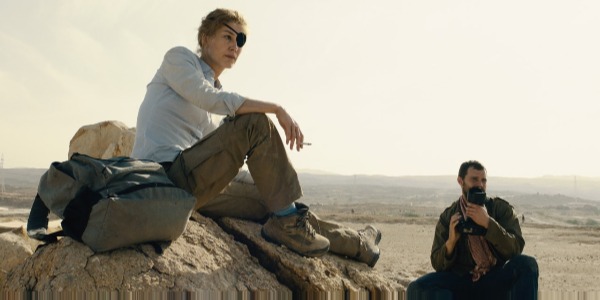
A Private War is hamstrung by a rushed first act, which wants to explain her eyepatch at the expense of giving a larger sense of her award-winning coverage of the Sri Lankan Civil War, and cliché techniques such as a birds-eye-view shot of a pivotal moment bookending the narrative. It’s all held together by Rosamund Pike, whose performance is a tour de force. Her absolute commitment to embodying Colvin, from the distinct voice to her sense of humour, matches the commitment Colvin had to covering the world’s injustices.
One of the highlights of the film is a domestic scene in which she devastatingly speaks to her photographer Paul Conroy of her inability to reconcile the horrors she has to witness with the necessity to witness them. “It’s because you’re addicted to it”, says Paul. It’s maybe the film’s best written moment that wasn’t transcribed from preexisting footage. Jamie Dornan expertly portrays Conroy, as anyone who saw the recent doc Under the Wire would know, and like Pike he similarly captures not just the look but the personality.
I can’t help but prefer to recommend the much more insightful and focused Under the Wire, which recounts Colvin and Conroy’s harrowing experience in Syria. A Private War improves significantly as it reaches the saga of Homs, but Heineman would probably have preferred to solely focus on Homs, interspersing his film with a countdown to the number of days till then. No matter which time of Colvin’s life we’re at, though, Rosamund Pike makes it compulsively watchable.
Shadow (Zhang Yimou)
Musanna Ahmed: Public service announcement – the use of split-screen is a lie. For those who saw the intriguing trailer of Shadow, it’s my displeasure to report that Zhang Yimou does not employ split-screen in his new period epic at all, not even for a single pair of frames. The tantalising prospects of juxtaposing images together to metaphorise the overriding yin and yang theme is sadly not realised. Nevertheless, Shadow engages with this theme in other ways and it doesn’t need split-screen to still be a sumptuous visual experience, which is largely due to the beautiful bichrome aesthetic.
Set during the Three Kingdoms period of China, it’s a deceptively simple story of kings and commanders where the hook is that there’s a “shadow” involved, a decoy who takes place of the real leader and, if necessary, must die for him. The presence of a princess adds the conflict of romance to the relationship between the major entities. The gorgeous two-colour palette is obviously a clear communicator of the aforementioned key theme, as are the differences in the characters’ moralities and motivations… for the most part. Dodgy deals, duels and double crossings ensure that things aren’t so black and white.
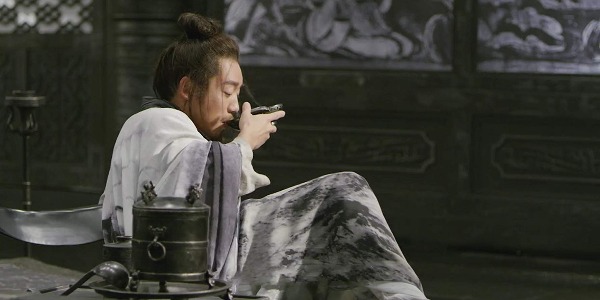
As to be expected from Zhang, the action is stylish as hell. Nobody does riding into battle better than Zhang; even his worst film (The Great Wall) had the pleasurable sight of soldiers arriving onto the battlefield via hot-air balloon. The coolest new weapon in the director’s catalogue of wuxia filmmaking is the bladed umbrella. It may be the most practical umbrella in cinema history, multi-purposed for lethal executions, protection from rain and raining arrows, and encapsulating oneself between two of them to slide into enemy territory looking like a Beyblade.
The arresting images tell a Shakespearean story in themselves, but it helps to have deceitful characters at the centre. It’s a marvel to see the auteur return with another wuxia epic, over a decade after his last, and approach it in a dazzlingly different way. Several filmmakers have made a return to form this year (from Spike Lee to Jason Reitman), but none have done with as much panache as Zhang Yimou.
Shock Waves – Diary of My Mind (Ursula Meier)
Alistair Ryder: One of the great achievements of this year’s London Film Festival was the sheer amount of female filmmakers showcased in the overall lineup. Whereas Cannes have never allowed films by more than three female directors to compete for the Palme D’Or in a single year, and Venice only programmed one female director in their competition lineup a couple of months back, this year’s LFF made headlines due to the sheer amount of female talent across the festival, accounting for 38% of films shown.
It’s not true equality yet, but it’s the closest any major film festival has managed to achieve the perfect gender split among directors in their programme – without compromising on quality to achieve this (acclaimed new films by Jennifer Kent and Clare Denis didn’t even make the cut this year, such is the wealth of riches). Swiss drama Shock Waves – Diary of My Mind was originally never intended to hit film festivals, crafted as an episode in crime anthology series Shock Waves that was deemed good enough to be released theatrically, although its humble television origins are largely undetectable.
Director Ursula Meier has taken a shocking true crime case and shifted the focus away from the inexplicably orchestrated cold blooded murder at the centre, crafting a peculiar character study that doesn’t indulge in armchair psychiatry in order to determine why a teenager murdered his own parents. It poses more questions than it answers, reflecting the complex realities of the case rather than exploitatively indulging in the true crime itself.
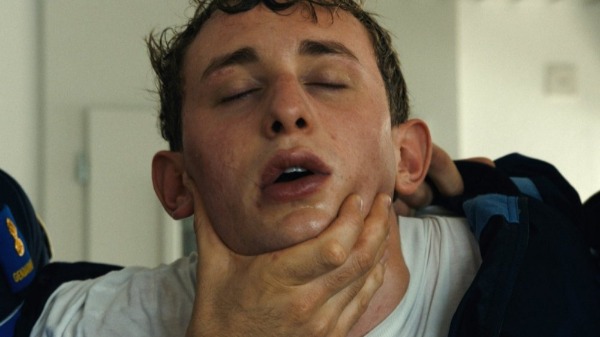
Based on an incident that took place in February 2009, Diary of My Mind follows Benjamin Feller (Kacey Mottet Klein), a high school student who kills both of his parents in his own home, shortly after posting a diary to his teacher Esther (Fanny Ardant) documenting why he carried out the act. The teacher and student didn’t have a particularly close relationship, making this all the more inexplicable – and although Esther doesn’t find answers, she’s treated with suspicion by various people within the law regarding how much she knew about Benjamin’s motives. Soon, she finds herself visiting him behind bars more and more.
Meier’s film is enigmatic without being austere, as well as being emotive without falling into empathy for the murderous teen at the centre. In just seventy minutes, she manages to explore the headspace of these two individuals without ever conducting a thorough psychological assessment; there’s a bold refusal to offer easy answers, especially considering the growing relationship between Esther and Benjamin. This might prove frustrating to some viewers, and admittedly in the second half, their conversations when they meet feel somewhat repetitive, like Meier is self-consciously attempting to avoid any deeper analysis. But for all its faults, it never stopped being intriguing.
At only 70 minutes, a clear hangover from its small screen origins, it’s easy to wish for a more incisive film documenting this story and the odd couple friendship at its centre. I don’t particularly want the enigma of Benjamin’s personality to be clarified, but I do hope that there’s a slightly longer cut that can scratch deeper than the surface.
Stan and Ollie (Jon Baird)
Gus Edgar-Chan: This writer is of the opinion that nowadays, one-take tracking shots are overused and overvalued. They’re flash for the sake of flash, a gaudy way of grabbing the audience’s attention while simultaneously distracting them from the contents of the scene. Having said all that, there’s something warmly nostalgic about following a camera as it tracks a bustling large-scale film set. As it fixates on the napes of two bowler hat-wearing buffoons. As it depicts an honest, heartwarming friendship, and the traces of conflict that threaten to rise to the surface. This is how Jon Baird’s Laurel & Hardy biopic, Stan & Ollie begins—and the giddy charm doesn’t just end there. It saturates the film, is injected into every crevice of the pair’s gags and mishaps, and, heck, brings the two comedy icons back from the dead.
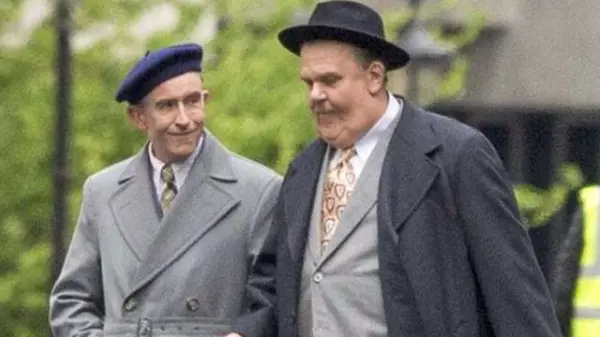
Baird makes the wise choice of framing his story during the swan song of the duo’s time in the limelight, where they were relegated to barren second-rate theatres as flashier comedians took centre stage. Setting a story so deep into their career makes the ruminations on the power of their friendship all the more, well, powerful, culminating in a (literally) show-stopping, heart-stirring final moment. Who cares if the conflict is exaggerated, or if the film never really feels rooted in the 1950s? There’s an eternal bond between the two that defies the naffness and turns you to jelly.
John C. Reilly delivers a good impersonation of Oliver Hardy as he jabbers through a rather hokey fat suit, but Steve Coogan here is remarkable. It’s less an impersonation and more a possession, as if Stan Laurel has been dug up and puppeteered—all wide-eyed expressions, quick wit and head scrunches. He brings a grounded sentimentality to the role that lingers long after the credits roll.
Though Baird doesn’t skimp on the humour, either. Stan & Ollie plays to its audience’s sensibilities in an ingenious way: it reuses classic gags, musters up a few setpiece inventions of its own, and blends the two until they’re hardly distinguishable. And then it goes further, and blurs the lines between performance and reality—the same sort of humour is used on and off stage, real moments with consequences play out as skits, and by the end, their legendary status can’t be separated from their personal lives. This film is a joyous ode to an iconic duo’s final few years, that portrays its subjects with the love and attention its audience craves.
Thanks for reading Film Inquiry’s London Film Festival coverage! Stay tuned to the site for coverage of festivals across the globe, from Tokyo International Film Festival, to AFI Fest in Los Angeles.
Does content like this matter to you?
Become a Member and support film journalism. Unlock access to all of Film Inquiry`s great articles. Join a community of like-minded readers who are passionate about cinema - get access to our private members Network, give back to independent filmmakers, and more.
Alistair is a 25 year old writer based in Cambridge. He has been writing about film since the start of 2014, and in addition to Film Inquiry, regularly contributes to Gay Essential and The Digital Fix, with additional bylines in Film Stories, the BFI and Vague Visages. Because of his work for Film Inquiry, he is a recognised member of GALECA, the Gay & Lesbian Entertainment Critics' Association.













